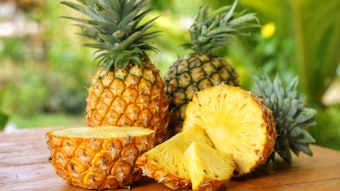
Sven Ballschmiede is the executive director of the International Organization of the Flavor Industry (IOFI). Perfumer & Flavorist+ connected with Ballschmiede to discuss his current assessment of the flavor industry and what innovations he sees on the horizon.
How would you assess the current state of the global flavor industry, particularly in light of recent global challenges?
Ballschmiede: The global flavor industry is navigating a complex and rapidly evolving landscape. While the sector continues to grow, it faces significant challenges, such as disruptions in global supply chains and climate change impacts on food production.
Recent regulatory changes, particularly stemming from the European Union, are heavily influencing the global market. For example, the updated European Food Safety Authority (EFSA) guidelines on flavoring safety evaluations, the recent ban on smoke flavorings in the EU or the EU Green Deal implementation, etc., are having ripple effects worldwide.
Despite these hurdles, flavorings remain essential in offering affordable and sustainable nutrition, particularly in addressing health concerns and promoting food innovation, and of course taste remains a key driver for consumers' choices.
The role of the flavor industry, in this context, is both to enhance product enjoyment through great flavor and taste, and to create flavors that support healthier eating habits, enhance food security and address sustainability.
 Sven BallschmiedeCourtesy of IOFI
Sven BallschmiedeCourtesy of IOFI
What are the key segments within the flavor industry where you see the most exciting innovations happening right now?
Ballschmiede: Exciting innovations are emerging in several key areas. In response to steadily growing health consciousness, the development of flavorings for low-sugar, low-salt, and low-fat foods is rapidly advancing. There is also a strong focus on plant-based alternatives, particularly in the dairy and meat sectors, as consumer demand for healthier and more sustainable products increases.
Innovations are also addressing the increasing concern of resource scarcity, with efforts aimed at developing alternative flavoring ingredients and reducing the environmental footprint of food production. New technologies have emerged like advanced encapsulation techniques, microbiological processes, or high-precision fermentation. These technologies are not only sustainable, but they also enhance sensory experiences in healthier food profiles.
Which flavor industry segments are encountering the most significant obstacles, and what are the driving factors behind these challenges?
Ballschmiede: The flavor industry constantly faces regulatory and market-related challenges. Regulatory measures, particularly those related to the safety and approval of certain flavoring substances, are becoming increasingly stringent.
The shift towards hazard-based approaches in regulatory assessments, like those seen in the EU, adversely impacts innovation and creates barriers for certain ingredients.
Additionally, consumers’ expectations, lifestyles, and eating habits require constant adaptation, but our industry is perfectly capable of providing adequate and multiple alternatives.
Are there any recent updates, initiatives, or projects from IOFI that you would like to highlight?
Ballschmiede: IOFI continues to support its members with valuable resources and initiatives. Recently, we released an updated version of the "Country List" in the IOFI Regulatory Database, which helps members stay informed about regional regulatory changes.
We also published the "Guidance Document for Specifications of Chemically Defined Flavoring Substances," which is available to our members. This document provides general guidance to ensure chemically defined flavoring ingredients used in food are safe and meet consistent quality standards.
Additionally, we released a revised Global Reference List (GRL) of Natural Complex Substances (NCS). This open-ended compendium of flavoring materials, considered safe for their intended use by an internationally recognized assessment body, is publicly available on our website.
Furthermore, we are rapidly advancing the Scope 3 project, which aims to address sustainability challenges within the flavor supply chain and help the industry better understand its environmental footprint.
This project, built as a data repository, covers emission factors for more than 160 key ingredients used in the flavor industry. It will serve as a valuable reference point for industry players to better understand their CO2 emissions and will be a precious resource and source of knowledge to advance in their sustainability journey.
How does IOFI envision the future of the flavor industry over the next decade, especially with evolving consumer preferences and technological advancements?
Ballschmiede: The future of the flavor industry is closely linked to growing consumer demand for health-conscious and environmentally sustainable products. IOFI envisions an industry that continues to contribute to society by developing flavorings that taste great, align with health trends and help address food resource scarcity.
The flavor industry will be essential in creating innovative solutions that minimize environmental impact while maintaining taste and consumer satisfaction. Technological advancements, such as the use of biotechnology and green chemistry, will drive the development of environmentally friendly ingredients and more sustainable flavoring options. This commitment to innovation is underscored by the industry’s significant investment in research & development, which averages 8-10% of its turnover. In summary, the industry’s adaptability to evolving trends and technological changes will be crucial to its success over the next decade.  "The flavor industry is vital in advancing global sustainability goals by ensuring that flavorings are safely produced and responsibly sourced," said Ballschmiede.LifeMedia at Adobe Stock
"The flavor industry is vital in advancing global sustainability goals by ensuring that flavorings are safely produced and responsibly sourced," said Ballschmiede.LifeMedia at Adobe Stock
What role do global sustainability goals play in shaping the direction of the flavor industry from IOFI's perspective?
Ballschmiede: Sustainability is a core value that drives IOFI’s mission. The flavor industry is vital in advancing global sustainability goals by ensuring that flavorings are safely produced and responsibly sourced. By prioritizing environmentally friendly practices, IOFI helps promote biodiversity conservation and reduce the environmental impact of flavor production.
In that context, the IOFI-IFRA Sustainability Charter serves as the cornerstone of our sustainability efforts and continues to grow with an increasing number of signatories. Based on the five key focus areas, the voluntary charter acts as a catalyst, encouraging broad industry participation and driving continuous improvement in sustainability practices.
IFRA and IOFI are working to update and enhance the toolbox accompanying the Charter, providing resources for signatory companies to support the commitments outlined.
The objective of this revision is to offer a more user-friendly, comprehensive, and tailored set of tools, particularly aimed at helping small and medium-sized enterprises (SMEs) advance in their sustainability journey.
How is IOFI helping the industry navigate complex regulatory environments and the increasing demand for transparency?
Ballschmiede: IOFI provides robust scientific and regulatory support to help the industry navigate an increasingly complex regulatory landscape. Our efforts include regional advocacy, sharing best practices, and educating stakeholders on key regulatory changes.
IOFI also monitors global legislation to ensure that its members have the information that they need to remain compliant with evolving requirements. IOFI regularly updates the Code of Practice and the Global Reference List, ensuring that industry standards align with international safety and quality expectations.
In addition, IOFI is actively involved at Codex Alimentarius and the Joint Expert Committee on Food Additives (JEFCA), promoting global harmonization of regulations. This proactive engagement streamlines global regulations, helping to reduce trade barriers and facilitate smoother international commerce.
In recent years, we have significantly ramped up our efforts and are committed to further strengthening collaborations with key Codex members.
In what ways is IOFI supporting innovation in areas such as biotechnology and natural flavor sourcing to meet changing market demands?
Ballschmiede: IOFI aims at ensuring regulatory frameworks enabling constant innovation to the benefit of end consumers, including the use of biotechnology. Regarding natural flavor sourcing, we are particularly active in adapting to changing market demands and evolving regulatory environments.
We have launched several initiatives, including training for members on the new Corporate Sustainability Due Diligence (CSDDD) directive, which will impact sourcing practices within the industry. Furthermore, IOFI is committed to activities linked to the Nagoya Protocol, which stipulates access and benefit-sharing, with respect to traditional knowledge associated with genetic resources in sourcing operations.
At IOFI, we have also undertaken significant work around the upcoming EU Deforestation Regulations (EUDR) and its scope, enabling our members to prepare for important changes in sourcing natural resources.










